South-American impressions...
A few friends have asked me for more details of our recent stay in South America.
> So send me more impressions of South America apart from he mountain things you did not tell me much.
Well, there are two sets of impressions, one from Argentina, Mendoza in particular, and the other from Chile.
The latter first. Our plane landed in Santiago, and we were to take a bus to go to Mendoza the following day, so we looked for a cheap hotel to crash for the night, showered (the weather was hot and humid, wich was a big change from our winter conditions), and then went to one of the town squares. It was a fairly pleasant nightwith lots of people milling about as it was still summer holidays.
The food was very average and quite expensive, and we ascribed that to the touristness of the area.
Santiago is a big town (from what we saw the equivalent of Jhb), but we didn't get to see the "Sandton" areas. The metro is very modern, clean and convenient, but it stops fairly early in the night. We caught a bus to go back to the hotel, and got up early to catch a bus (rather a minibus, but without the blaring music, and only one passenger per seat.
The road to Mendoza crosses the Andes, only a few kilometers from the Aconcagua. It's about 400km and takes about five to six hours. Border crossing reminded me of Europe in the 1960s, just with more modern technology: all our bags went through X-ray machines, and we had to queue for about an hour to get our passports stamped.
The road was similar to South African national roads: there are a lot of heavy trucks driving on it, and winter damages were still apparent.
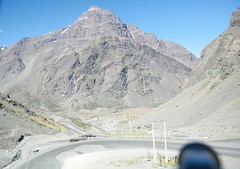
We got to Mendoza in mid-afternoon and were met at the bus station by a guy that works for the local youth hostel. The owner of the youth hostel in Mendoza also owns a few hostels in the area, and a logistics operation to take tourists up to the Aconcagua (including camps in the national park, mules and so on).
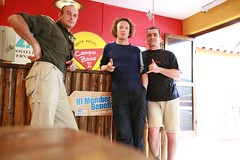
Mendoza is a town slightly bigger than PE, set in a countryside where they grow a lot of grapes and produce excellent wine. Food and living is pretty cheap, if you have Euros or Dollars. The local people complain about price increases that have gone up much faster than salaries in the last few years. The town council seems to be pretty progressive, as in the week when we came back from the Aconcagua there was a festival of music and danse in the main town park, where thousands of people congregated. There was lots of food and trinkets for sale, and people danced until daybreak.
The people in Mendoza were courteous, friendly and open. We made contact with quite a few locals.
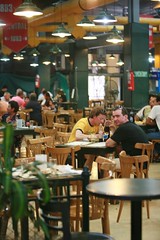
The food there is good, the meat excellent, reputedly the best in the world (remember the steaks we ate in Buenos Aires?). Tourism is a fairly substantial source of income for that region.
The only thing missing from the region is the sea. Mendoza is about 900m above sea-level, about the same as Jhb, if I remember well. The climate is good in winter, thanks to a foehn effect: cold humid air rises from the Pacific side of the Andes, looses its moisture on the way up, and warms up markedly on the way down (we occasionally observe this phenomenon in the Alps and get balmy days in winter).
There is little snow in winter, almost none in town, but quite a bit on the surrounding hills.
There are a few hills around Mendoza where it's possible to paraglide (big bonus! ;-)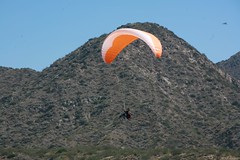
My command of Spanish is increasing. Mickael spent a year traveling in South America a few years ago, and there were times when I corrected him (although, to be fair, not very often).
Mendoza is definitely a place where I would live for a while, and the only thing it's missing is the sea. There are a few lakes in the proximity (most of the land is irrigated thanks to water coming down from the Andes, there is little rain most of the year), but I didn't get to see them.
Regarding Chile, we traveled from Mendoza to Valparaiso overnight in a "luxury coach" (a bus where the seats are far enough apart and tilt to stretch as beds).
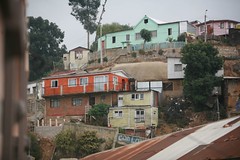
We didn't spend much time in Valparaiso, as our aim was to find a place where we could soar above the Pacific. We'd done some research on the Internet, and our first destination was Maitencillo. A one and a half hour bus ride later, we discovered a small sea-side town that looks like Plett did twenty years ago, without Robberg and the Beacon-Isle hotel.
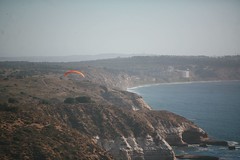
The wind was too strong when we got there, but it abated in the late afternoon, and we managed to get an hour flight or so before we caught the bus to go back to Valparaiso. We decided to stay in Maitencillo and found a small pension close to the flying field, perched on top of the cliff.
We thus spent almost a week in relative luxury, enjoying delicate home-made food and soaring for hours on end on the ridge of the cliff, admiring the beach below.
Overall, it was a very relaxing stay, and we had a lot of fun. I would go back anytime, and even consider staying in Mendoza for a few years, as Maitencillo is at a reasonable driving distance for flying week-ends away.
> So send me more impressions of South America apart from he mountain things you did not tell me much.
Well, there are two sets of impressions, one from Argentina, Mendoza in particular, and the other from Chile.
The latter first. Our plane landed in Santiago, and we were to take a bus to go to Mendoza the following day, so we looked for a cheap hotel to crash for the night, showered (the weather was hot and humid, wich was a big change from our winter conditions), and then went to one of the town squares. It was a fairly pleasant nightwith lots of people milling about as it was still summer holidays.
The food was very average and quite expensive, and we ascribed that to the touristness of the area.
Santiago is a big town (from what we saw the equivalent of Jhb), but we didn't get to see the "Sandton" areas. The metro is very modern, clean and convenient, but it stops fairly early in the night. We caught a bus to go back to the hotel, and got up early to catch a bus (rather a minibus, but without the blaring music, and only one passenger per seat.
The road to Mendoza crosses the Andes, only a few kilometers from the Aconcagua. It's about 400km and takes about five to six hours. Border crossing reminded me of Europe in the 1960s, just with more modern technology: all our bags went through X-ray machines, and we had to queue for about an hour to get our passports stamped.
The road was similar to South African national roads: there are a lot of heavy trucks driving on it, and winter damages were still apparent.

We got to Mendoza in mid-afternoon and were met at the bus station by a guy that works for the local youth hostel. The owner of the youth hostel in Mendoza also owns a few hostels in the area, and a logistics operation to take tourists up to the Aconcagua (including camps in the national park, mules and so on).

Mendoza is a town slightly bigger than PE, set in a countryside where they grow a lot of grapes and produce excellent wine. Food and living is pretty cheap, if you have Euros or Dollars. The local people complain about price increases that have gone up much faster than salaries in the last few years. The town council seems to be pretty progressive, as in the week when we came back from the Aconcagua there was a festival of music and danse in the main town park, where thousands of people congregated. There was lots of food and trinkets for sale, and people danced until daybreak.
The people in Mendoza were courteous, friendly and open. We made contact with quite a few locals.

The food there is good, the meat excellent, reputedly the best in the world (remember the steaks we ate in Buenos Aires?). Tourism is a fairly substantial source of income for that region.
The only thing missing from the region is the sea. Mendoza is about 900m above sea-level, about the same as Jhb, if I remember well. The climate is good in winter, thanks to a foehn effect: cold humid air rises from the Pacific side of the Andes, looses its moisture on the way up, and warms up markedly on the way down (we occasionally observe this phenomenon in the Alps and get balmy days in winter).
There is little snow in winter, almost none in town, but quite a bit on the surrounding hills.
There are a few hills around Mendoza where it's possible to paraglide (big bonus! ;-)

My command of Spanish is increasing. Mickael spent a year traveling in South America a few years ago, and there were times when I corrected him (although, to be fair, not very often).
Mendoza is definitely a place where I would live for a while, and the only thing it's missing is the sea. There are a few lakes in the proximity (most of the land is irrigated thanks to water coming down from the Andes, there is little rain most of the year), but I didn't get to see them.
Regarding Chile, we traveled from Mendoza to Valparaiso overnight in a "luxury coach" (a bus where the seats are far enough apart and tilt to stretch as beds).

We didn't spend much time in Valparaiso, as our aim was to find a place where we could soar above the Pacific. We'd done some research on the Internet, and our first destination was Maitencillo. A one and a half hour bus ride later, we discovered a small sea-side town that looks like Plett did twenty years ago, without Robberg and the Beacon-Isle hotel.

The wind was too strong when we got there, but it abated in the late afternoon, and we managed to get an hour flight or so before we caught the bus to go back to Valparaiso. We decided to stay in Maitencillo and found a small pension close to the flying field, perched on top of the cliff.
We thus spent almost a week in relative luxury, enjoying delicate home-made food and soaring for hours on end on the ridge of the cliff, admiring the beach below.
Overall, it was a very relaxing stay, and we had a lot of fun. I would go back anytime, and even consider staying in Mendoza for a few years, as Maitencillo is at a reasonable driving distance for flying week-ends away.
